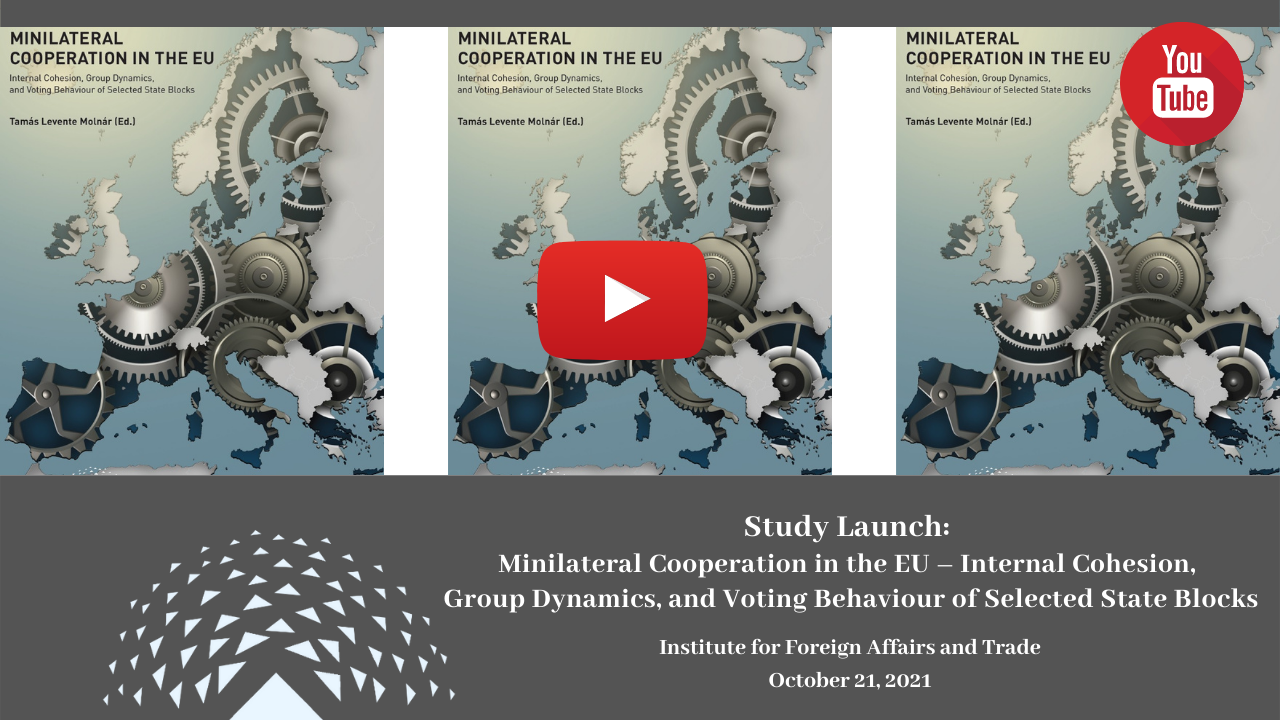A group of researchers presented their latest findings at an online study launch organized by the Institute for Foreign Affairs and Trade (IFAT) on 21 October. The research, titled Minilateral Cooperation in the EU – Internal Cohesion, Group Dynamics, and Voting Behaviour of Selected State Blocks took about one and a half years and the project was supported by the International Visegrad Fund.
At the beginning of the study presentation, IFAT’s director Márton Ugrósdy greeted the participants. His remarks were followed by the keynote speech of François Roux, senior advisor at the Egmont Institute, who was focusing on the European minilateral cooperation from a practical point of view.
In the next section, the authors of the study presented the most important findings of their research. First, Tamás Levente Molnár, a research fellow at IFAT, the study’s editor and co-author described the main structure and objectives of the research. According to him, an increasing number of scientific articles concerning European minilateralisms have been published in recent years, however, no research has been conducted that uses a comparative study on the one hand and applies both a quantitative and a qualitative methodology on the other. Concerning the latter, first, Levente Kocsis, a MA student at the Leiden University and co-author of the study presented the applied quantitative methodology based on the analysis of the voting records, then Nikolett Garai, a research fellow at IFAT and co-author of the research explained the qualitative methodology based on expert interviews.
Following the authors of the case studies presented their results. First, Juraj Sýkora, a junior researcher at the Bratislava-based Slovak Foreign Policy Association (SFPA) introduced the Benelux cooperation to the audience, including the policy preference and voting behaviour of the participating three countries. Afterwards, Tamás Levente Molnár presented the E3 group, consisting of France, Germany and the United Kingdom. This was followed by Matúš Mišík, a researcher at SFPA, who talked about the Mediterranean Seven group, which brings together seven southern European countries. Vít Havelka, a researcher at the Prague-based EUROPEUM Institute focused on the voting behaviour, internal group dynamics, and external voting partners of the countries of the Visegrad Group. The last case study of the research, the Weimar Triangle was introduced by Nikolett Garai. At the end of the event, Tamás Levente Molnár summarized the most important conclusions of the research. The online event was moderated by Tamás Baranyi, deputy director at IFAT.
For the full recording please click on the link below or visit our Youtube-channel!
JTNDaWZyYW1lJTIwd2lkdGglM0QlMjIxMDAlMjUlMjIlMjBoZWlnaHQlM0QlMjI0NTAlMjIlMjBzcmMlM0QlMjJodHRwcyUzQSUyRiUyRnd3dy55b3V0dWJlLmNvbSUyRmVtYmVkJTJGbDdHNmNEVTMtdGclMjIlMjB0aXRsZSUzRCUyMllvdVR1YmUlMjB2aWRlbyUyMHBsYXllciUyMiUyMGZyYW1lYm9yZGVyJTNEJTIyMCUyMiUyMGFsbG93JTNEJTIyYWNjZWxlcm9tZXRlciUzQiUyMGF1dG9wbGF5JTNCJTIwY2xpcGJvYXJkLXdyaXRlJTNCJTIwZW5jcnlwdGVkLW1lZGlhJTNCJTIwZ3lyb3Njb3BlJTNCJTIwcGljdHVyZS1pbi1waWN0dXJlJTIyJTIwYWxsb3dmdWxsc2NyZWVuJTNFJTNDJTJGaWZyYW1lJTNF

